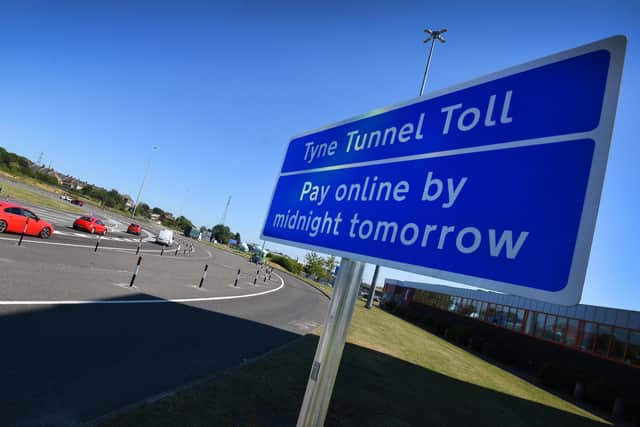Tyne Tunnel: Bosses insist first year of 'cashless' Tyne Pass system has led to 'faster, smoother journeys', despite criticism of fines for late toll payment
and live on Freeview channel 276
It has been 12 months since the crossing’s old toll booths and barriers were ditched in an effort to speed up journey times and reduce pollution levels.
While transport bosses insist the huge change has achieved its goals, it has been far from plain sailing for the new ‘Tyne Pass’ system.
Advertisement
Hide AdAdvertisement
Hide AdEarlier this year the switch was branded an “absolute disaster” – with complaints about the new toll payment methods, “threatening” enforcement notices, and fines wrongly issued to people living hundreds of miles away.


However, figures revealed on the scheme’s first anniversary on Tuesday confirmed the percentage of drivers successfully paying their toll by the deadline of midnight on the day after their journey has reached a new high.
Tunnels operator TT2 said that 3.11% of motorists were issued with a fine for not paying their toll in October, down from 5.39% in its first month.
But, with more than 1.5 million vehicles crossing the river each month, this still adds up to tens of thousands of penalty notices issued – generating more than £13.5 million for TT2 since November 2021.
Advertisement
Hide AdAdvertisement
Hide AdPhilip Smith, chief executive of TT2, said: “I am incredibly proud of how far we have come in the year since we introduced such a significant, historic change at the tunnels.
"Our main objectives of delivering faster, smoother journeys, reduced emissions and better local air quality have been met and we continue to listen to customers and analyse data and feedback to make sure we continuously improve our processes and the customer experience.”
Almost 17.5 million journeys have been made through the tunnels since the switch to the cashless model and TT2 says trips are more than 40 seconds faster.
It also claims CO2 emissions have fallen by more than 90%.
Under the free flow system, drivers can pay their toll online; with a pre-paid account; over the phone; or in shops with PayPoint counters.
Advertisement
Hide AdAdvertisement
Hide AdCritics of the changes have called for smaller late payment fines.
Drivers currently face a £60 penalty, reduced to £30 if paid within 14 days or increased to £100 if not settled within 28.
More than 20,000 people have signed an online petition calling for unpaid toll charges to be cancelled and for a “more ethical and affordable” system to replace the existing penalties.
A review conducted by Transport North East (TNE), which manages tunnel operator TT2’s contract on behalf of the North East Joint Transport Committee, admitted in September that some aspects of the Tyne Pass “would have been done differently if the system was planned again” – but said that criticism of it had been “disproportionate”.
Advertisement
Hide AdAdvertisement
Hide AdTolls are due to increase in 2023, rising 30p for car drivers and 50p for HGVs – although a decision on this had to be delayed after too many Tyne and Wear councillors missed a key meeting.
Regional transport chiefs said the change was needed because of rising inflation levels, but suggested the increase be held until May to avoid putting struggling residents under further financial strain over the winter.
Councillors are now due to vote on the proposal next week.
